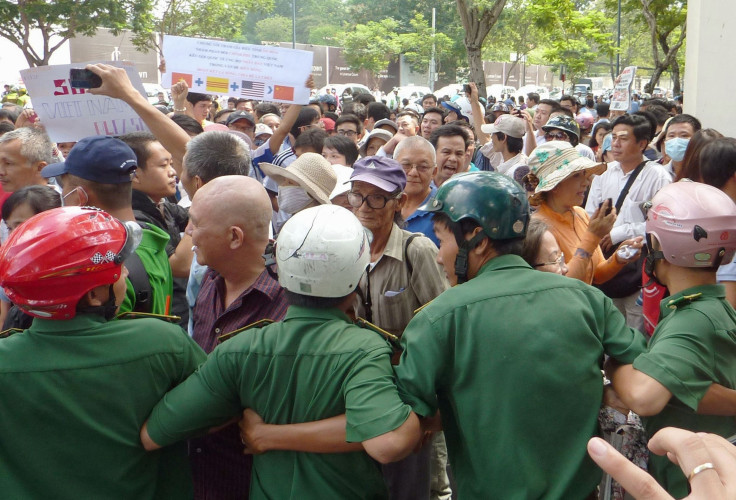China Sends Ships, Planes To Evacuate Its People From Vietnam After Deadly Riots Continue Over Chinese Oil Rig In South China Sea

Thousands of Chinese nationals are being evacuated from Vietnam amid rising violence stemming from a territorial dispute in the South China Sea.
Four ships, out of the total five designated to evacuate Chinese nationals from Vietnam, arrived at Vung Ang port Monday while one ship left for Vietnam Sunday, Xinhua reported, adding that two charter flights also carried 291 nationals back to China Sunday. More than 3,000 people have been evacuated from Vietnam since the violence began last Tuesday, targeting Chinese and Taiwanese companies, which were set ablaze and looted by rioters protesting against an oil rig dispatched to the South China Sea by Beijing.
"To stay or not to stay is now the question for those who already have factories in the Southeast Asian country after their factories were looted and burned down by protesters late last week," China Daily, a local state-run newspaper, said in an editorial Monday, according to Reuters.
Vietnamese authorities deployed more security outside the Chinese embassy in Hanoi as nearly 135 workers have been injured in the riots and two Chinese have been killed so far. China’s foreign ministry has also suspended parts of bilateral exchange plans with Vietnam starting Sunday, and announced that it will take further measures if necessary, Xinhua reported.
Factories owned by foreign investors, especially those belonging to Chinese and Taiwanese companies, were set ablaze and looted by rioters protesting against Beijing for sending an oil rig close to the Paracel Islands, which are controlled by China but also claimed by Vietnam. Protests in Vietnam grew to include nearly 20,000 workers who protested against China’s move in Ho Chi Minh City and Hanoi.
Vietnam's government, which allowed peaceful protests early last week, has been criticized for not doing enough to contain the violence, which could potentially threaten the inflow of foreign investments into the Asian nation.
"It is not the protests per se that are the major concern of investors and their governments. It is the inability of the Vietnamese central government and its local counterparts to bring the protests under control," China Daily said in its report, according to Reuters, adding: "The severity of the violence and the heavy losses foreign firms have suffered raises the question of whether the Vietnamese government attaches enough importance to the interests of investors and the security of foreign factories."
On Saturday, Vietnam’s Prime Minister Nguyen Tan Dung enlisted the help of telecom workers to send text messages to rioters, urging them "not to participate in illegal protests that cause public disorder and harm social safety," CNN reported, while 318 suspects were arrested in Dong Nai province, in the northeast of Ho Chi Minh City, for inciting violence.
Taiwan's government began the evacuation of thousands of its citizens from Vietnam Thursday. The rioting reportedly wounded two Taiwanese nationals and caused huge losses to hundreds of Taiwanese companies, according to a report from IANS.
Meanwhile, U.S. officials have called China’s move of introducing an oil rig in a disputed region of the South China Sea provocative, and have asked for a dialogue to resolve the issue.
“China’s decision to introduce an oil rig accompanied by numerous government vessels in waters that are disputed with Vietnam is provocative and raises tensions, absolutely, and that this is a unilateral action that appears to be part of a broader pattern, quite frankly, of Chinese behavior to advance its claims over disputed areas in a manner that really undermines peace and stability in the region,” Marie Harf, deputy spokesperson for the U.S. Department of State said, in a briefing Thursday.
© Copyright IBTimes 2025. All rights reserved.






















